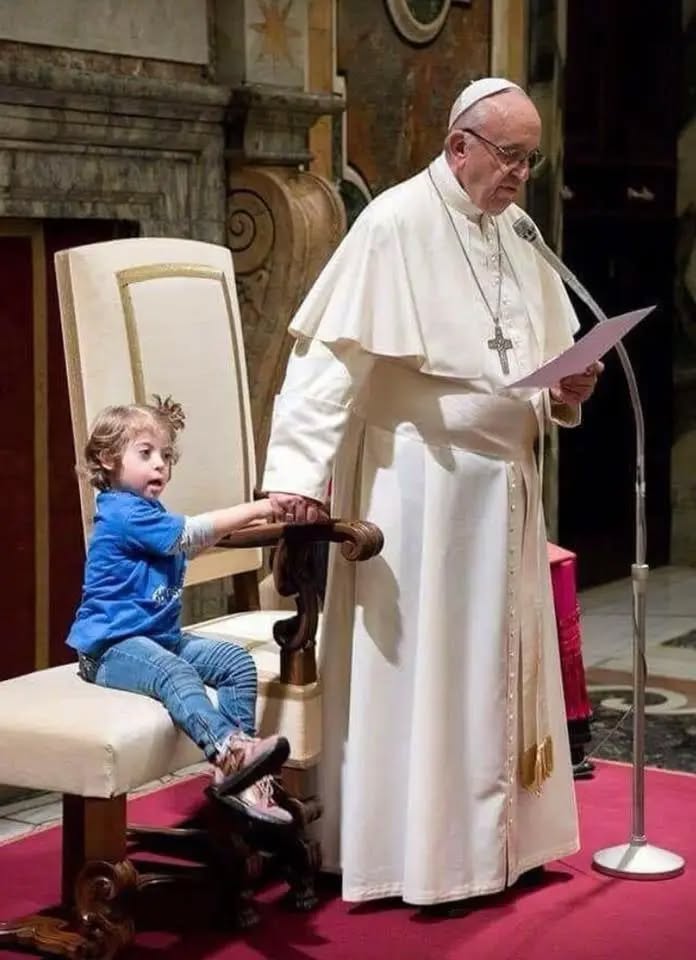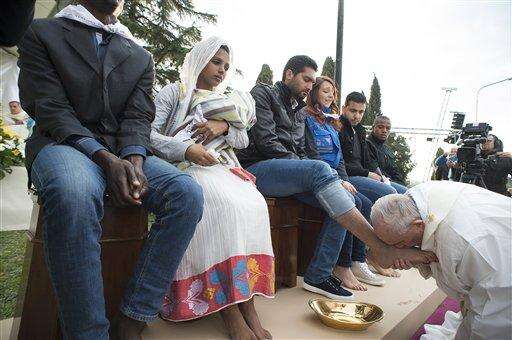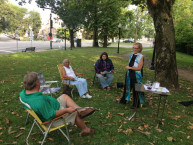
April 27, 2025: Alleluia! Christ is Risen!
Happy Easter! Now, for all of you that thought Easter was last Sunday…today is Easter…too, or 2. Easter is not just a single day on the calendar. We are still celebrating Easter and we are in Eastertide until the day of Pentecost, this year falling on June 8th.
And because we always read this text from John on this Sunday, the one about Thomas, some call this Doubting Thomas Sunday. Thomas is my absolute second favorite apostle…after Mary Magdalene, of course. I love Thomas because Thomas is me – and really, all of us. And most of you know from past sermons that we have done Thomas wrong all these years. But before we get there, let’s do a brief recap of this story of the first appearance to the male disciples. I say male because Jesus already appeared to the women – first.
Now, about this appearance to the guys, I think they likely breathed a sigh of relief. I mean, Jesus entered and said “Peace be with you” not “Woe to you who denied me, couldn’t stay awake, didn’t believe Mary and the other women, never did seem to get anything I told you, etc., etc., etc.” Whew!
The only problem is that Thomas wasn’t there. Where was he? Who knows. Maybe he was out at Costco grabbing supplies. Or, maybe he got stuck in the Route 80 sink hole traffic (God help him). Or maybe he was just out for a smoke break. Wherever he was, he missed the big reveal. Now, that’s gotta stink, right?
I mean, come on – has it ever happened to you that something amazing happened, and you just missed it? I know that seems to happen here in New Jersey a lot. I mean every single time there is some sort of cool astrological phenomenon you can guarantee it will be clear everywhere else but New Jersey. I swear it’s true.
Well anyway, when Thomas gets back from wherever he was, the others tell him what happened, and he refuses to believe it until he can see Jesus for himself. And the thing is – as I point out each year, he didn’t ask for anything more than what all the other boys asked for when they were told by Mary Magdalene and the rest of the women about the empty tomb. Those guys refused to believe it, until it happened to them.
The text is clear – after he said the Peace be with you part, it then says “…he showed them his hands and his side. Then the disciples rejoiced…” Mary didn’t need to see that. She knew him by his voice alone according to this gospel – just as he said – that the sheep will recognize the shepherd’s voice. Nope – they just stood there until he showed them the wounds on his hands and his side.
So, all Thomas wanted was what those other guys got – what those earliest hearers and readers of this gospel wanted – what we want really, if you think about it. They all wanted to physically see the risen Jesus. And because Thomas also wanted this, and was honest about it, he’s been called “Doubting Thomas,” as though somehow doubt’s a bad thing. But it isn’t.
Nope, being a Thomas isn’t a bad thing at all, but a necessary thing, for any person or community of faith. As I say often, you can’t have faith without doubt. If you do, it isn’t faith at all, but certainty – the opposite of faith.
And that’s good news for us today to be sure. Because now, more than ever, we are very much like those earliest disciples.
Remember what it was like for them. They had witnessed the unjust arrest and brutal execution of their beloved rabbi by the Roman governor. They knew they could be next, and they were right. Their world had been turned upside down in just a few short days. They were grieving, angry, fearful, and worn to the bone. Their faith had taken a beating too. Where was God in all of this? How could God allow Jesus, the one they thought to be the Messiah, to be put to death on the cross?
Today many of us ask the same thing. We word it differently, but it is essentially the same question: How could God allow these terrible things to happen? Where is Christ? And we can even sometimes begin to doubt that any of this that we profess is real. We want, really need, the same thing Thomas did – some sort of reassurance that it is all true – that Jesus is risen and with us.
Yet speaking on this very thing, Pope Francis once said: “Having doubts and fears is not a sin… The sin is to allow these fears to determine our responses, to limit our choices, to compromise respect and generosity, to feed hostility and rejection… The sin is to refuse to encounter the other, the different, the neighbor, when this is in fact a privileged opportunity to encounter the Lord … to overcome our fears so as to encounter the other, to welcome, to know and to acknowledge him or her.”
Perhaps more importantly, Pope Francis said: “The faith we proclaim […] makes us see God present in all those situations where we think he is absent… He is present in the unwelcomed visitor, often unrecognizable, who walks through our cities and our neighborhoods, who travels on our buses and knocks on our doors.”
Sadly, this week the Vatican announced to the world – Sede Vacante – the papal seat is empty. The pope had died.
Jorge Mario Bergoglio as he was known before his election, was truly one who understood what it meant to serve Christ. His life as a Jesuit and as Pontiff was one of trying to reshape the Roman Catholic church, and really all of Christendom, into an active agent of Jesus’ transformational love.
While he did not change troubling policies on the full inclusion of women and LGBTQ+ people in the Roman Catholic church, he did more than any others before him to lift them up, making it clear that judgement should not be the focus of the church. Rather, he lived by example what he felt the church should be. He broke with tradition – rather than washing the feet of priests, he knelt before the feet of the poor and of women on Maundy Thursday. He chose to live in humble dwellings rather than the papal palace apartment, drove a Ford Focus rather than ride in a limo, and he ordered a church wide dialog – for the first time making the church listen to the laity.
He said, “Even in the developed world, the effects of unjust structures and actions are all too apparent. Our efforts must aim at restoring hope, righting wrongs, maintaining commitments, and thus promoting the well-being of individuals and of peoples.”
And so, for Pope Francis, the wounds of Christ that the male apostles wanted to see, are there in the eyes of the marginalized, the oppressed, the poor, and the lost. When we encounter them, we will see the risen Jesus, and our lives will be transformed. It surely was for Thomas, who when he saw the wounds of Jesus made an acclamation of faith as no other disciple had ever done. He said, “My Lord, and my God!”
“My Lord and my God!” Do you think he was going to sit around in that room after that? Hell no. Same for the rest of them too. Seeing the risen Jesus meant leaving their safe place and doing the work they were called to do in the world – loving and serving the Christ, who destroyed death and brings new life to all.
In the lesson from the Acts of the Apostles we heard today, Thomas, and all the others, were arrested and brought before the temple authorities, who threatened them if they continued to follow Jesus – to proclaim the good news in word and deed. The apostles answered them, “We must obey God rather than any human authority.”
This was not an easy thing to say or to do. What they were risking were their very lives. They knew that standing up to the temple authorities, or to the Roman empire, risked persecution and possibly death. They also knew that it was the only way for them. In fact, the early Jesus movement was called “The Way.”
And so they stepped forward into their lives as leaders of this earliest Jesus movement, telling those in power that they answered to a higher authority. Some might call this civil disobedience, but they would just say it was following Jesus.
Now it is our turn.
Today we are the ones who are being told to be silent, to stop our work, or that we are being too “political,” when we speak and act in love and service to Jesus in the world. Unbelievably sometimes, those voices come from within our own pews! Yet we know that there is no other way for those who have experienced the risen Christ – here in the Eucharist, and in the eyes of those we serve in his name. We will not stand by, we will not be silenced. We will proclaim the good news of God’s unconditional love. We will step boldly forward as those earliest apostles did, because “We too must obey God rather than any human authority.”
We will not stand by while people, some of them children as young as two years old, some who are sick with cancer, some who are US citizens, are unconstitutionally deported without due process of law, persecuted because of the color of their skin or the basis of their beliefs.
We will not be silent while judges are arrested for showing compassion to the marginalized, for ensuring that the rule of law is justly administered without fear or prejudice, for standing up to tyranny when it seeks to harm the least of these.
We will proclaim the good news of God’s unconditional love, denouncing the sin of Christian Nationalism as a heresy, and working to prevent the perversion of the gospel, when it is used to harm any child of God.
We will step forward to serve the marginalized and oppressed, to demand justice for them, to love and care for them, to be their voice when they are silenced.
This we will do, because we too obey a higher authority, and because when we do these things, we know we meet the risen Christ, which will be our own salvation.
The earliest disciples, when they encountered Jesus, when they came to understand the truth of the resurrection, were impelled out of the room in which they had been hiding, and into the world to serve him. No authority, religious or secular, could stop them. Many of them died a martyr’s death. Yet after seeing his wounds, there was no other life for them.
We will see his wounds today too, if we are willing to seek them like Thomas. We will see them in those who are spiritually, emotionally, physically, and mentally, beaten down. We also encounter him here at this table, for he becomes truly present in the breaking of the bread. And because of this, there is no other life for us either.
Pope Francis put it this way, “It’s hypocrisy to call yourself a Christian and chase away a refugee or someone seeking help, someone who is hungry or thirsty, toss out someone who is in need of my help… If I say I am Christian, but do these things, I’m a hypocrite.”
Indeed. We were meant to see his wounds and to love him, as he loved us. Pope Francis modeled this servant life for all the world.
And so one may rightly argue that sede vacante happened the moment they elected Jorge Mario Bergoglio as Pope, because he knew that he must obey God, not any human authority – not even the Curia, the power structure of the church in Rome. So, he wasn’t one to sit – in the Vatican or anywhere else. Like Jesus, this Pope was on the loose, and he went into the world to touch the wounds of Jesus in the poor and outcast, to heal them with the balm of God’s unconditional love, to kneel before the least of these and to wash their feet, as Jesus would do.
he went into the world to touch the wounds of Jesus in the poor and outcast, to heal them with the balm of God’s unconditional love, to kneel before the least of these and to wash their feet, as Jesus would do.
He was not perfect. He was without sin, and he often said that. None of us are.
And so, we say now, well done good and faithful servant of the risen Lord. Well done. For he now walks in the embrace of the God he humbly served.
May we have the same said about us when it is our time to leave this earthly plane.
Amen.
For the audio, click below, or subscribe to our iTunes Sermon Podcast by clicking here (also available on Audible):
The Rev. Diana L. Wilcox
Christ Church in Bloomfield & Glen Ridge
April 27, 2025
The Second Sunday of Easter – Year C
1st Reading – Acts 5:27-32
Psalm 150
2nd Reading – Revelation 1:4-8
Gospel – John 20:19-31




